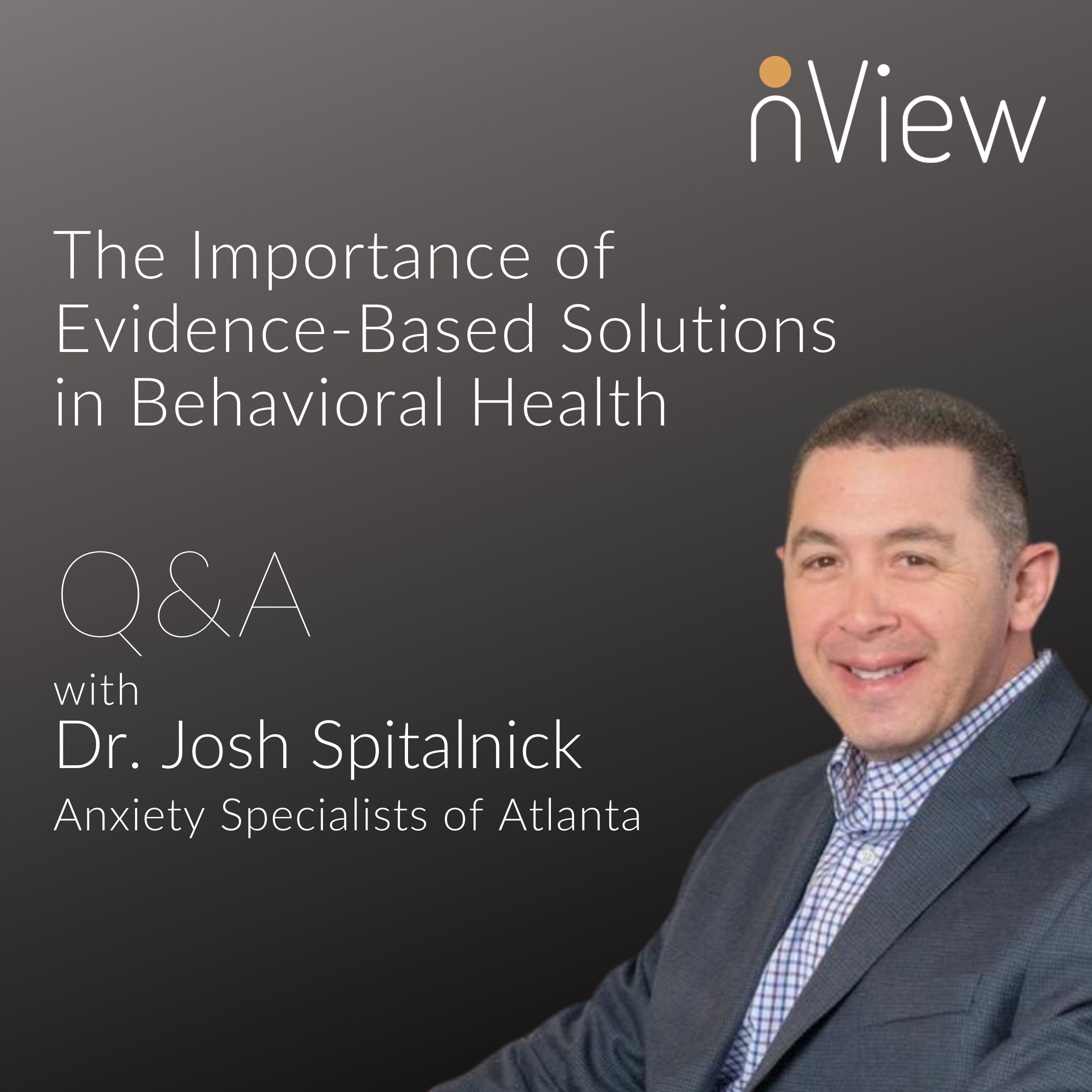Evidence is defined as, “The available body of facts or information indicating whether a belief or proposition is true or valid.” Using evidence-based behavioral health tools is the topic of today’s post.
With literally thousands of behavioral health assessment tools on the market, it’s important for mental health specialists and physicians to find solutions that are based on evidence.
Unlike physical health, where evaluation tools like an X-ray of a broken bone or an echocardiogram of a heart can be used to identify physical characteristics, mental health assessment involves patient-reported symptoms, not physical facts. It can be challenging for patients to communicate their feelings and fears, which in turn makes it challenging for mental health specialists to identify and properly diagnose the disorder.
Q&A with Dr. Josh Spitalnick

To properly diagnose a patient with a behavioral health disorder, like anxiety, depression, schizophrenia, or PTSD, specialists must use evidence-based assessment tools. Josh Spitalnick, PhD, ABPP is a licensed psychologist and anxiety and OCD expert, who shared his insights on this topic recently in a Mental Healthcare Today podcast. He is board-certified in behavioral and cognitive psychology, clinical director and owner of Anxiety Specialists of Atlanta (one of the largest anxiety clinics in the southeast), and an adjunct professor of psychiatry at Emory University. Here is what he had to say on the topic of evidence-based instruments.
Q: What are some of the unique issues mental health professionals face when it comes to diagnosing patients?
Dr. Josh Spitalnick: The stigma that comes with some disorders is an issue many behavioral health specialists face. Some disorders are viewed as more embarrassing or less treatable than others. Some disorders are less likely to get reimbursed by insurance. All of these are considerations that many specialists have to consider. There are ethical challenges that therapists and doctors face because they should diagnose the disorders that the evidence-based efforts define; but some providers can be reluctant to diagnose things like Autism, personality disorders, and substance abuse disorders because of the misinformation that is out there about the disorders.
Q: In your opinion, how important is it for professionals to use evidence-based tools when assessing patients?
JS: Using evidence-based tools is fundamentally necessary because these tools support evidence-based diagnoses that lead to evidence-based interventions. By doing so, you don’t undercut the science of mental health, and if you improvise or make up your own assessment methods, they may not be leading to an accurate diagnosis. For consistency and accuracy and fidelity to the science, evidence-based tools were designed to effectively and efficiently get to an accurate diagnosis based on the current symptom criteria, which is the Diagnostic and Statistical Manual of Mental Disorders, 5th Edition (DSM-5). However, as important as evidence-based assessment, diagnosis, and treatment planning are, it is also important to consider the contextual evidence or the person-specific factors in treatment planning.
Q: Based on your experience, how can providers strike the right balance between evidence-based tools and contextual evidence? And what does this mean to you?
JS: The DSM follows a specific and symptom-focused approach to understanding problem areas, but it doesn’t take into account the context of the individual, such as cultural upbringing, racial identity, sexual identity, or even demographics. Evidence is designed for anybody, but not for the person sitting in front of you. We need to consider contextual factors that get to the person-specific problem. The combination of evidence-based assessment, diagnosing, and treating patients should be matched with qualitative interviews that ask questions about the person’s upbringing and family environment. Understanding how the individual’s culture informed the current issue is equally important.
Q: What are some of the pitfalls you’ve seen when evidence-based tools are not used?
JS: When providers don’t use evidence-based assessment tools, they are more likely to diagnose a generic disorder or a poorly defined disorder like General Anxiety Disorder, or Depression, or an adjustment disorder that does not have clearly defined treatment plans. These “bucket-list” or “empty category” diagnoses rarely get reimbursed by insurance and have little to no research behind clear interventions. Therefore, the patient is not getting the most evidence-based and best possible therapeutic treatment experience.
Q: Many technology companies appear to be jumping into behavioral health. What trends do you think mental health professionals should be watching for over the next 12-18 months?
JS: 1. There is a definite trend of more digital assessments and instruments to assess and track patient symptoms within the EHR system vendors. I’m watching professionals online asking each other: “Which EHR systems have the best assessment tools already included?” or “Which EHR systems have the right tools for me to make assessments that are not included?” This is happening without any regard to which instruments are owned or copywritten by others. There will be a few companies focused on aggregating and making available these evidence-based tools that are so important to the insurance companies for reimbursement.
2. Providers are also trying to find all of the technology tools they need under one roof. They want one solution to address the many needs of therapists, including synchronous video visit capabilities, patient scheduling, assessment instruments, and even secure email and communication tools. There are 20-30 well-known EHR solutions out there today, but none of them have everything integrated into one solution. I see some of the big technology vendors, like Google, trying to bring all of those under one umbrella to capitalize on these needs.
3. I am also seeing the advent of online therapists popping up, which is good for improving patient access; but unfortunately, many of these therapists are not as well trained, specialized or experienced to address the notable increase in psychiatric patients in the last year.
4. With the explosion of video-based technology, I expect that we will see more interactive tools for training therapists coming onto the market in the future. These tools will help therapists become more specialized. I hope that in the next one to five years, we will see more training platforms that take the brick and mortar of graduate school and overhaul it to increase the speed of innovation and help therapists be more effective at patient care.
A Growing Need
The importance of using evidence-based behavioral health assessment tools comes at a time when there has been a significant spike in the number of people seeking access to skilled mental health services due to the global pandemic. According to the National Association of Mental Illness (NAMI), one in five Americans is living with a mental health condition.
Proem Health provides mental health specialists and primary care physicians with access to evidence-based behavioral health solutions to support their diagnosis. Contact us for more information.





.png)






